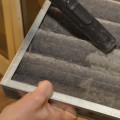Excessive amounts of dirt and debris, including soot, can cause your furnace filter to turn black. If you don't regularly check the filter, the large amount of dirt could cause it to become clogged and turn black. This is especially true if you burn candles or have a fireplace. A black furnace filter is often due to carbon monoxide (CO) buildup and a clogged filter.
Candle soot, fireplace smoke, or mold are also common causes. Damaged ventilation grilles are also possible culprits. Checking your furnace filter only to find that it has turned completely black is alarming, to say the least. Although it happens, this is not normal. A black furnace filter indicates that something is wrong with your system or in your home.
These are some of the probable causes. Carbon monoxide is probably the worst reason a filter turns black. It's a poisonous gas, and if it's leaking into your home, you and your family could be breathing it. Carbon monoxide leaks can result from damage to the interior of the furnace. However, the gas could come from another source.
For example, you could enter a house from the garage. Vehicles produce carbon monoxide when running and at idle. Regardless of the cause, addressing the problem must become a top priority. Since this gas is odorless, you won't notice it without the help of a carbon monoxide detector. If the source of the leak affects the heating equipment, carry out repairs immediately.
Brennan Heating & Air Conditioning experts are available to help you with furnace repair and maintenance. An air filter collects dirt, dust and other impurities. Look for the filter to turn dark gray, as it catches a lot of these things. Over time, if you don't change the filter as scheduled, it may turn black. Soot can cause your air filters to turn black quickly, leaving you surprised when you remove the filter to replace it with a clean one. If your oven filter turns black quickly, you may have a serious problem with carbon monoxide and you should call an HVAC company to determine the cause and advise on how to resolve it.
When the air cleaner is clogged, it can restrict airflow, hampering your home's indoor air quality and damaging the HVAC system in the process. Oven filters should be checked monthly and changed every three months for standard fiberglass filters. Oven filters are primarily designed to protect your oven from dirt and debris that could damage it, but modern filters can also help improve the air quality in your Cincinnati home. Failure to change the filter can reduce the air quality in your home and cause premature wear and tear on your heating and HVAC system. A high-quality air filter that is regularly replaced keeps soot trapped, so you'll never notice until you change your air filter. If the filter has turned black due to carbon monoxide or mold, then yes, these substances can make you sick. Cheaper 1-2 inch filters need to be replaced about once every three months, while 3-4 inch filters need to be replaced every six months.
If you find mold on your air filter, it's important to dispose of it immediately and replace the air filter in your air conditioner. But while it's normal for some dust to build up on the air filter, if you find that the air filter is black, it could be indicative of another problem with your heating and cooling system. While your oven filter is designed to sift dirt from other oven equipment, getting dirt stuck in the filter compromises its function and the function of the entire oven.


